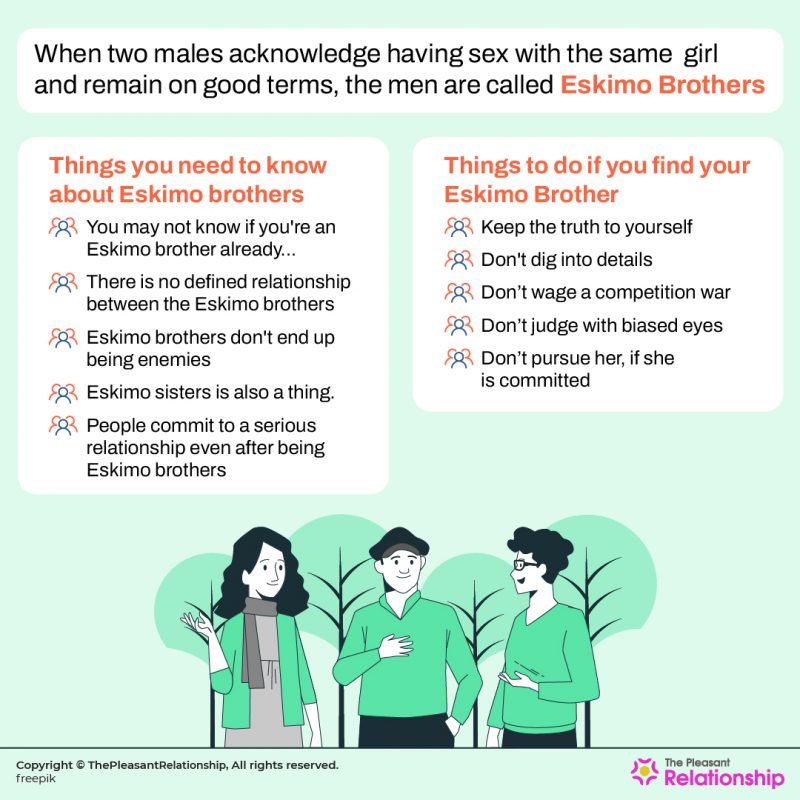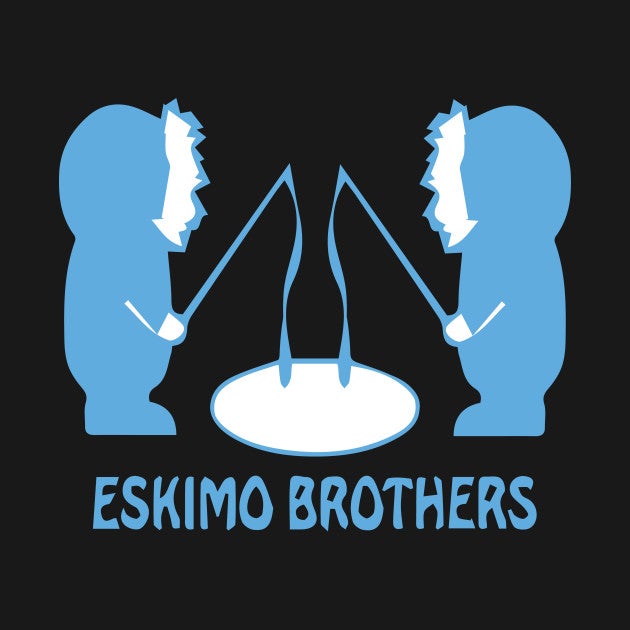Eskimo Brothers: Meaning, Origin, & Popularity - Explained
Is there a term that encapsulates the unique, often unspoken bond forged between two men who have shared a romantic connection with the same woman? The phrase "eskimo brothers" has emerged as a controversial label for this specific dynamic, sparking debates about its origins, implications, and lasting relevance in modern society.
The terminology, rooted in the American vernacular, is primarily used within the context of male friendship and casual conversation. The term has its roots in a certain degree of ambiguity, and its exact inception remains shrouded in a veil of speculation and debate. The origins of the phrase can be traced to the United States, a linguistic phenomenon that rapidly gained traction among younger generations.
The definition of "eskimo brothers" is relatively straightforward. It refers to two men who have, at different times, engaged in sexual relations with the same woman. This shared experience, whether known or unknown between the individuals involved, creates a unique social connection. Its a connection that navigates the realms of camaraderie, competition, and often, a subtle understanding.
The term gained traction due to its simple, albeit somewhat crude, explanation. The concept was popularized, particularly, in the second episode of the American television sitcom "The League." A character named Taco, played by Jon Lajoie, is credited with presenting the definition to his circle of friends. The scene demonstrates how the character utilizes this shared experience to garner benefits, such as complimentary beverages at a local bar. This on-screen portrayal played a significant role in cementing the phrase into popular culture.
The origin of the term itself, however, remains a subject of academic and linguistic interest. While the exact genesis is difficult to pin down, a widely held theory suggests a potential link to the cultural practices of the Inuit and Aleutian peoples. Some scholars have proposed that the term may have arisen from a misunderstanding or even a fabricated narrative surrounding these communities' traditions, including polygamy and polyamory, as practiced by married women and male guests. It's important to note that historical accuracy here is often questioned, and interpretations vary.
In some scenarios, the term may inadvertently present a misogynistic view, portraying women as mere objects of competition between men. The language can, at times, seem to trivialize the woman's agency in the sexual relationships. Yet, the term has achieved a degree of acceptance, especially amongst younger groups, it has become ingrained in casual conversations.
The impact of media on the popularization of "eskimo brothers" is undeniable. The sitcom "The League," is responsible for significantly propelling the term into the mainstream, and it is frequently referenced in the series' storylines. The show's use of the term cemented its presence in the collective consciousness of a wider audience. However, the term has also been employed in various other instances, including in the television show "Seinfeld," which introduced the concept around 1999. The entertainment industry undoubtedly plays a role in the continued application of this specific language.
The etymological trail also includes references to the term in other spheres of modern social conversation. Lil Pump, a famous personality, is known for using the phrase, and it is widely accepted in online social channels and various media platforms. This proliferation, in conjunction with the initial entertainment platform usage, solidifies its position within modern parlance.
Exploring further, one might consider the term's reception across varied cultural and generational groups. This is where the potential for misinterpretations and sensitivities comes into play. For some, the term represents little more than a playful, informal marker of a specific situation. For others, it can represent an outdated, potentially offensive concept. This divergence in understanding highlights the subtle nuances involved in how the term is perceived.
The evolving usage of language is a central point when considering the term. The context in which it is employed plays a critical role in determining whether it is considered appropriate or insensitive. It can vary across geographical lines and even through different social strata. In some instances, it serves as a convenient shorthand for a shared experience; in others, it is met with reservation.
There is also an academic component to the term's use. Linguistic scholars have looked into the origins and usage, tracing the way it has evolved through time. The term's association with the Inuit people can, in certain cases, become a significant focus of examination. Research into the cultural sensitivity of this terminology is also an important consideration, as the impact of language on the way a person or group is identified has significant implications.
One can also look at the relationship between "eskimo brothers" and broader issues of gender dynamics and interpersonal relationships. The term, by its nature, touches upon issues of masculinity, sexual encounters, and friendship, and can expose a degree of competitiveness between men.
The concept of the term is also used to initiate a discussion about the ethics of sexual encounters, the impact of social labels, and the nature of consent and mutual respect. Discussions regarding these related topics provide further depth, and give rise to a more nuanced understanding of the term and its implications.
The use of the term in social conversations also raises the subject of boundaries and sensitivities. In a climate of heightened awareness regarding language and its effect on individuals, it becomes crucial to consider whether this type of speech is useful or offensive.
The longevity of the term "eskimo brothers" is yet another consideration. Its ongoing use shows the strength of cultural influence. The debate surrounding the term highlights the dynamic nature of language. One can also evaluate alternative methods of describing the experience of sharing a romantic relationship with someone.
Ultimately, the story of "eskimo brothers" illustrates the way language can evolve, shape cultural dynamics, and provoke debate. This is a reflection of the complex nature of human relationships, and the ongoing dialogue regarding social labels.
The core meaning remains the same: a straightforward designation of two men who have shared a physical relationship with the same woman. But the implications and ramifications of the term are far more complex. The term offers a glance at the ever-changing dynamics of language and societal evolution. One may also find it a starting point for a more complex dialogue on modern interpersonal and social relationships.
| Attribute | Details |
|---|---|
| Term | "Eskimo Brothers" |
| Definition | Two men who have been sexually intimate with the same woman. |
| Origin | Likely originated in the United States, gained popularity in the late 20th century. |
| Popularization | Popularized by the American TV show "The League," particularly in the second episode. Also referenced in shows like "Seinfeld." |
| Context of Use | Often used in informal conversations among men; also used in comedic contexts. |
| Possible Origins | The term may have originated from misinterpretations or invented narratives about Inuit and Aleutian cultural practices, although historical accuracy is debatable. |
| Controversy | Some consider it misogynistic, as it can reduce women to objects of competition between men. |
| Modern Usage | Still used in informal contexts, and has appeared in tweets by famous personalities. |
| Linguistic Analysis | Discussed in linguistic contexts and explores the evolution of language and its effects on societal discourse. |
| Related Terms | "Brotherhood", other informal terms for shared experiences. |
| Cultural Impact | Reflects evolving societal views on relationships and casual social interactions. |
| Gender Dynamics | Reveals the potential for competitiveness and the understanding of masculinity within friendship. |
| Ethics | Opens a discussion about the ethics of relationships, societal labeling and consent |
| Sensitivity | Raises questions about appropriate language and its impact, also highlights the need to understand how language is perceived |
| Alternative terminology | Considers whether more neutral or respectful phrases can be used. |
| Reference | Wikipedia |


